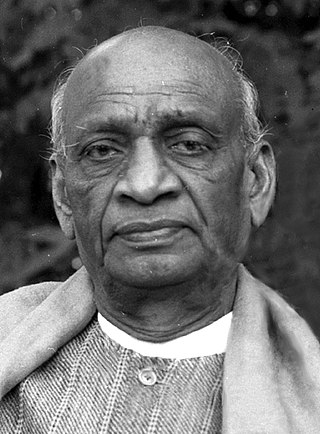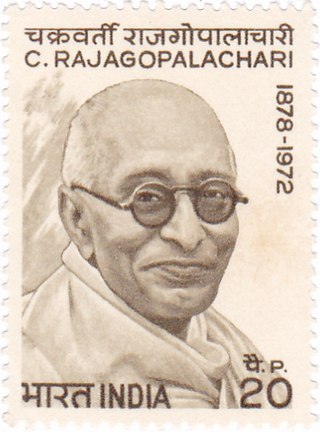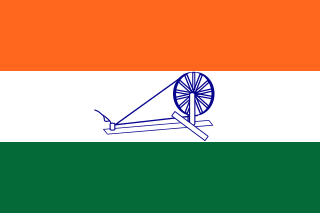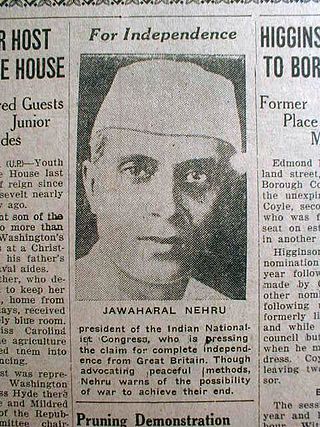
Jawaharlal Nehru was an Indian anti-colonial nationalist, secular humanist, social democrat, and author who was a central figure in India during the middle third of the 20th century. Nehru was a principal leader of the Indian nationalist movement in the 1930s and 1940s. Upon India's independence in 1947, he became the first prime minister of India, serving for 16 years. Nehru promoted parliamentary democracy, secularism, and science and technology during the 1950s, powerfully influencing India's arc as a modern nation. In international affairs, he steered India clear of the two blocs of the Cold War. A well-regarded author, his books written in prison, such as Letters from a Father to His Daughter (1929), Glimpses of World History (1934), An Autobiography (1936), and The Discovery of India (1946), have been read around the world. The honorific Pandit has been commonly applied before his name.

Vallabhbhai Jhaverbhai Patel, commonly known as Sardar Vallabhai Patel, was an Indian independence nationalist, barrister and statesman who served as the first Deputy Prime Minister and Home Minister of India from 1947 to 1950. He was a senior leader of the Indian National Congress, who played a leading role in the country's struggle for independence, guiding its integration into a united, independent nation. In India and elsewhere, he was often called Sardar, meaning "Chief" in Hindi, Urdu, Bengali and Persian. He acted as the Home Minister during the political integration of India and the Indo-Pakistani War of 1947.

The Indian National Congress (INC), colloquially the Congress Party or simply the Congress, is an Indian political party. Founded in 1885, it was the first modern nationalist movement to emerge in the British Empire in Asia and Africa. From the late 19th century, and especially after 1920, under the leadership of Mahatma Gandhi, the Congress became the principal leader of the Indian independence movement. The Congress led India to independence from the United Kingdom, and significantly influenced other anti-colonial nationalist movements in the British Empire.

Chakravarti Rajagopalachari BR, popularly known as Rajaji or C.R., also known as Mootharignar Rajaji, was an Indian statesman, writer, lawyer, and independence activist. Rajagopalachari was the last Governor-General of India, as India became a republic in 1950. He was also the first Indian-born Governor-General, as all previous holders of the post were British nationals. He also served as leader of the Indian National Congress, Premier of the Madras Presidency, Governor of West Bengal, Minister for Home Affairs of the Indian Union and Chief Minister of Madras state. Rajagopalachari founded the Swatantra Party and was one of the first recipients of India's highest civilian award, the Bharat Ratna. He vehemently opposed the use of nuclear weapons and was a proponent of world peace and disarmament. During his lifetime, he also acquired the nickname 'Mango of Salem'.

The Non-cooperation movement was a political campaign launched on 5 September 1920, by Mahatma Gandhi to have Indians revoke their cooperation from the British government, with the aim of persuading them to grant self-governance.

Motilal Nehru was an Indian lawyer, activist and politician belonging to the Indian National Congress. He also served as the Congress President twice, 1919–1920 and 1928–1929. He was a patriarch of the Nehru-Gandhi family and the father of Jawaharlal Nehru, the first Prime Minister of India.

Kamala Nehru was an Indian independence activist and the wife of Jawaharlal Nehru, the first Prime Minister of India. Her daughter Indira Gandhi was the first female Prime Minister of India.

The Indian Home Rule movement was a movement in British India on the lines of the Irish Home Rule movement and other home rule movements. The movement lasted around two years between 1916–1918 and is believed to have set the stage for the independence movement under the leadership of Annie Besant and Bal Gangadhar Tilak to the educated English speaking upper class Indians. In 1920 All India Home Rule League changed its name to Swarajya Sabha.

Independence Day is celebrated annually on 15 August as a public holiday in India commemorating the nation's independence from the United Kingdom on 15 August 1947, the day when the provisions of the Indian Independence Act, which transferred legislative sovereignty to the Indian Constituent Assembly, came into effect. India retained King George VI as head of state until its transition to a republic, when the Constitution of India came into effect on 26 January 1950 and replaced the dominion prefix, Dominion of India, with the enactment of the sovereign law Constitution of India. India attained independence following the independence movement noted for largely non-violent resistance and civil disobedience.

Jivatram Bhagwandas Kripalani, popularly known as Acharya Kripalani, was an Indian politician, noted particularly for holding the presidency of the Indian National Congress during the transfer of power in 1947 and the husband of Sucheta Kripalani. Kripalani was an environmentalist, mystic and independence activist who was long a Gandhian socialist, before joining the economically right wing Swatantra Party later in life.
Mahavir Tyagi was a prominent Indian independence fighter and parliamentarian from Dehra Dun, Uttar Pradesh India.

The Indian National Congress was established when 72 representatives from all over the country met at Bombay in 1885. Prominent delegates included Dadabhai Naoroji, Surendranath Banerjee, Badruddin Tyabji, Pherozeshah Mehta W. C. Bonnerjee, S. Ramaswami Mudaliar, S. Subramania Iyer, and Romesh Chunder Dutt. The Englishman Allan Octavian Hume, a former British civil servant, was one of the founding members of the Indian National Congress.
Congress Radio, also known as Azad Radio, was an underground radio station that operated for about three months during the Quit India Movement of 1942, a movement launched by Mahatma Gandhi against the British Raj for independence of India. Congress Radio was the broadcasting mouthpiece of the Indian National Congress and functioned from different locations in Bombay, present-day Mumbai, and briefly from Nashik. It was organized by Usha Mehta (1920–2000), then a 22-year student activist, with the help of amateur radio operators. Others who were involved included Vithalbhai Jhaveri, Vitthaldas Khakar, Chandrakant Jhaveri, and Babubhai Thakkar. The broadcasting equipment was supplied by Nanik Motwane of Chicago Radio, Bombay. Prominent leaders of the Indian independence movement like Ram Manohar Lohia, Achyutrao Patwardhan, and Purushottam Trikamdas were also associated with Congress Radio.

The Declaration of Purna Swaraj was a resolution which was passed in 1930 because of the dissatisfaction among the Indian masses regarding the British offer of Dominion status to India. The word Purna Swaraj was derived from Sanskrit पूर्ण (Pūrṇa) 'Complete', and स्वराज 'Self-rule or Sovereignty', or Declaration of the Independence of India, it was promulgated by the Indian National Congress, resolving the Congress and Indian nationalists to fight for Purna Swaraj, or complete self-rule/total independence from the British rule

The Gandhi cap is a white sidecap, pointed in front and back and having a wide band. It is made out of khadi. It takes its name after the Indian leader Mahatma Gandhi, who created it and first popularised its use during the Indian independence movement.

The Quit India speech was given by Mahatma Gandhi on the eve of the Quit India movement, August 8, 1942. His address was issued shortly before midnight at the Gowalia Tank Maidan park in Bombay, which has since been renamed August Kranti Maidan.

The Nehru–Gandhi family is an Indian political family that has occupied a prominent place in the politics of India. The involvement of the family has traditionally revolved around the Indian National Congress, as various members have traditionally led the party. Three members of the family–Jawaharlal Nehru, Indira Gandhi and Rajiv Gandhi–have served as the prime minister of India, while several others have been members of parliament (MP).

After power transformation, on 15 August 1947, Jawaharlal Nehru assumed office as the first Prime Minister of India and chose fifteen ministers to form the First Nehru ministry.
The light has gone out of our lives is a speech that was delivered ex tempore by Jawaharlal Nehru, the first Prime Minister of India, on January 30, 1948, following the assassination of Mahatma Gandhi earlier that evening. It is often cited as one of the greatest speeches in history.
















